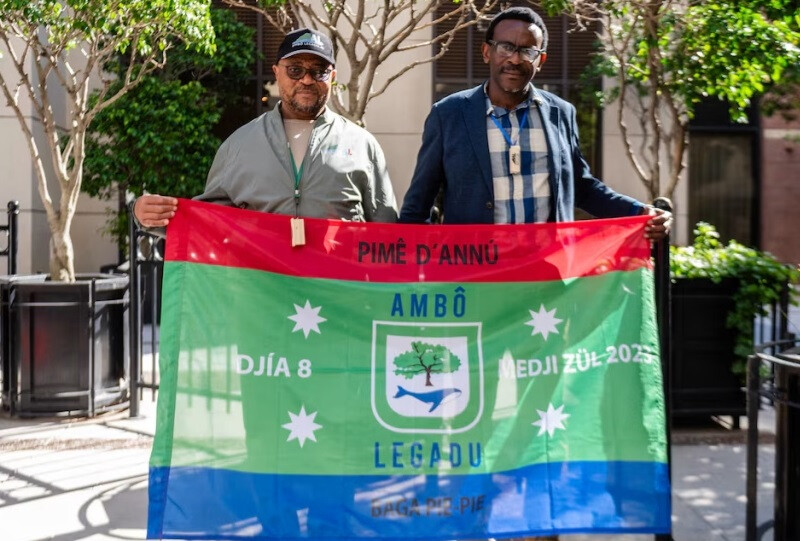
The small Central African island of Annobón has captured international attention by declaring its independence from Equatorial Guinea and requesting "associate state" status from Argentina. This move appears to be a complex result of historical ties under Spanish colonial rule within the same administrative division and a backlash against the dictatorial rule of the current Equatorial Guinean regime.
Annobón's Declaration of Independence and the 'Ambo Legadu' Movement
Annobón, a small island of 17 square kilometers with a population of about 5,000, is located in the Gulf of Guinea and is part of Equatorial Guinean territory. Its residents primarily speak Annobonese Creole, a Portuguese-based creole. In 2022, a political movement called 'Ambo Legadu', led by Orlando Cartagena Lagar, declared Annobón's unilateral independence. This movement invoked Annobón's historical right to self-determination and resistance against the oppressive rule of the Equatorial Guinean government.
However, the Equatorial Guinean government did not recognize this declaration of independence, and Lagar currently resides in exile in Spain. Cartagena Lagar, proclaimed the "Prime Minister" of Annobón by the 'Ambo Legadu' movement, has visited various countries to gain international support. Last week, he visited Buenos Aires, Argentina, focusing on persuading them to recognize Annobón as an "associate state" of Argentina.
In an interview with Radio Rivadavia, he stated, "We are asking for political support from Argentina, we want to be part of Argentina but we do not want to be annexed. This could be an 'associate state' or even 'provincial' status. The projects we have submitted are currently under review, and we are asking for support and visibility."
Historical Ties and Criticism of the Dictatorship
Annobón's request to Argentina is based on historical ties that go beyond simple political support. In the 1800s, Annobón was part of the Viceroyalty of the Río de la Plata of the Spanish Empire, from which Argentina declared its independence in 1816. Cartagena Lagar emphasized, "We are brothers, and we were once part of the same territory. Today, we once again ask our brotherly nation, Argentina, for help." This highlights how past administrative divisions serve as a crucial justification for the current political independence movement.
Furthermore, Lagar strongly criticized Equatorial Guinea's dictatorial regime, stating that it is "slowly starving our people and polluting our land," and that the island has now become a "toxic waste dump." These remarks suggest that Annobón's independence movement is not merely a nationalist aspiration but a desperate plea regarding humanitarian and environmental issues. Geographically isolated, approximately 700 km southwest of Malabo, the capital of Equatorial Guinea, Annobón's desire to break free from central government control may be even stronger.
Equatorial Guinea's Political Situation and International Scrutiny
The government of Equatorial Guinea has been characterized by international observers as a dictatorship. After gaining independence from Spain in 1968, Francisco Macías Nguema declared himself president for life in 1972 but was overthrown by a coup in 1979 by his nephew, Teodoro Obiang Nguema Mbasogo. Mbasogo has remained president ever since, breaking the record for the world's longest-serving head of state. During his rule, there have been continuous criticisms of suppression of opposition and human rights abuses.
In 2024, The Guardian reported that measures were taken to suppress dissent, including the detention of dozens of people, following the launch of the 'Ambo Legadu' movement. This indicates that the Equatorial Guinean government views Annobón's independence movement as a threat to national security.
In this context, the actions of the Argentinian government are drawing more attention. Earlier this month, Argentina's Ambassador to Ethiopia, Juan Ignacio Roccatagliata, visited the Equatorial Guinean Ambassador, which many interpret as a sign that Argentina's Milei administration is signaling support for the Equatorial Guinean government. If the Argentinian government officially supports the Equatorial Guinean government, it could be a major blow to Annobón's independence movement.
Argentina's Choice and Annobón's Future
Annobón's request for 'associate state' status from Argentina presents a diplomatic dilemma for the Argentinian government. On one hand, it could acknowledge historical ties under past colonial rule and heed the humanitarian plea of Annobón's residents fighting against a dictatorship. On the other hand, it must consider its existing relationship with the Equatorial Guinean government and the diplomatic ramifications of supporting a territorial secessionist movement in another country under international law.
Annobón's future will depend not only on Argentina's choice but also significantly on the attention and support of the international community. The independence aspirations of this small island reveal a complex facet of international issues, intricately entwined with human rights, self-determination, and the remnants of past colonial rule. The repercussions of Annobón's request for 'associate state' status on Argentina and the international community remain to be seen.
[Copyright (c) Global Economic Times. All Rights Reserved.]




























